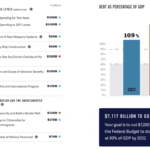It’s Financial Literacy Month – Are You Using This Essential Financial Tool?
It’s Financial Literacy month and, for many Americans, that’s a good thing.
Too often I shake my head in exasperation when fiscal topics are front-and-center on the national news. Too few, including those reporting the stories, seem to
Take for example the tax cuts that went into effect in January of 2018.
Stories abounded in 2018 that allowed the (false) claim that “the tax cuts only benefitted the rich” to stand unchecked.
Each time I heard or read that statement I cringed at the outright lie that was being forced upon those reading or watching.
Of course people wouldn’t believe that, right?
It wasn’t until I saw the results of a tax cut-related poll later in 2018 that I realized how naive I was.
A significant number of people firmly believed the tax cut of 2018 did not benefit them at all!
If only they had read Savings Beagle. I wrote a fairly detailed overview of the provisions of the Tax Cuts and Jobs Act, including a Tax Plan Calculator where individuals could input information and get an idea of how the tax plan would impact their specific situation.
The information was out there. And for anyone willing to look, he or she would have seen that the vast majority of Americans benefited from more money in their paychecks in 2018 thanks to revised tax tables.
The problem – too few even knew they were getting more money in each and every paycheck!
The only downside to the tax table changes, and, in turn, more money in everyone’s paychecks, was that for some, paycheck withholding amounts changed.
Which led to the next blowup in the news cycle earlier this year…”American taxpayers are getting less money back from the federal government in the form of tax refunds!”
An issue, once again, not unforeseen. It was publicized, and I wrote about, the need for Americans to check withholding rates at the IRS website to ensure there wouldn’t be a surprise come tax time this year.
So when the news went bonkers over people not getting their expected tax refunds…or having to actually pay, rather than get money back…I just shook my head some more.
Whether those in the media were being purposefully disingenuous touting how horrible the tax cut was to be cutting Americans’ tax refunds, or just ignorant to basic financial principles, I don’t know.
The problem that became evident, however, was that Americans should have had a handle on what the tax cut did for them and how it might a
But, many didn’t.
I can ignore the withholding aspect…it’s somewhat complicated.
The fact, however, that many Americans weren’t even aware their paychecks were bigger as a result of the tax cut is hard to forgive.
This, is the most basic principle of personal finance. Know how much money you have coming in, and how much money (and to where) you have going out.
Which is the key takeaway with which I hope readers will leave…if you don’t have a budget set up so you can see your financial situation at a glance, take the time now to make that happen.
The Essential Financial Tool
A monthly budget, where your income and expenses are listed, is essential for knowing where you are financially.
And while it may take some effort to set up initially, once it’s done, it only takes tweaking when income or expenses change to keep an eye on your financial situation.
Here’s a basic spreadsheet that can be used as a template.
[embeddoc url=”https://savingsbeagle.com/wp-content/uploads/2019/04/Monthly-Budget.xlsx” download=”all” viewer=”microsoft”]As long as you have access to Microsoft Excel, you can download this spreadsheet to use as you wish. The formulas are set up to add the income numbers, the expense numbers and calculate your net cash situation.
Once you have a handle on your financial situation, you can move on to more advanced financial literacy topics such as saving, investing, etc.
But first, you need the foundation – a budget – from which to build.
Knowledge is the key to success in any endeavor. And a budget gives you just that when finances are of interest.
If only many more Americans had the knowledge a budget provides, there might have been a little more appreciation for what the tax cuts actually did, and a little less uproar and misinformation over what was perceived.
We all can use a little brushing up when it comes to our



:max_bytes(150000):strip_icc()/medicare101-bf80ac5ea86e47648d91b622fd7e497e.jpg?w=150&resize=150,150&ssl=1)